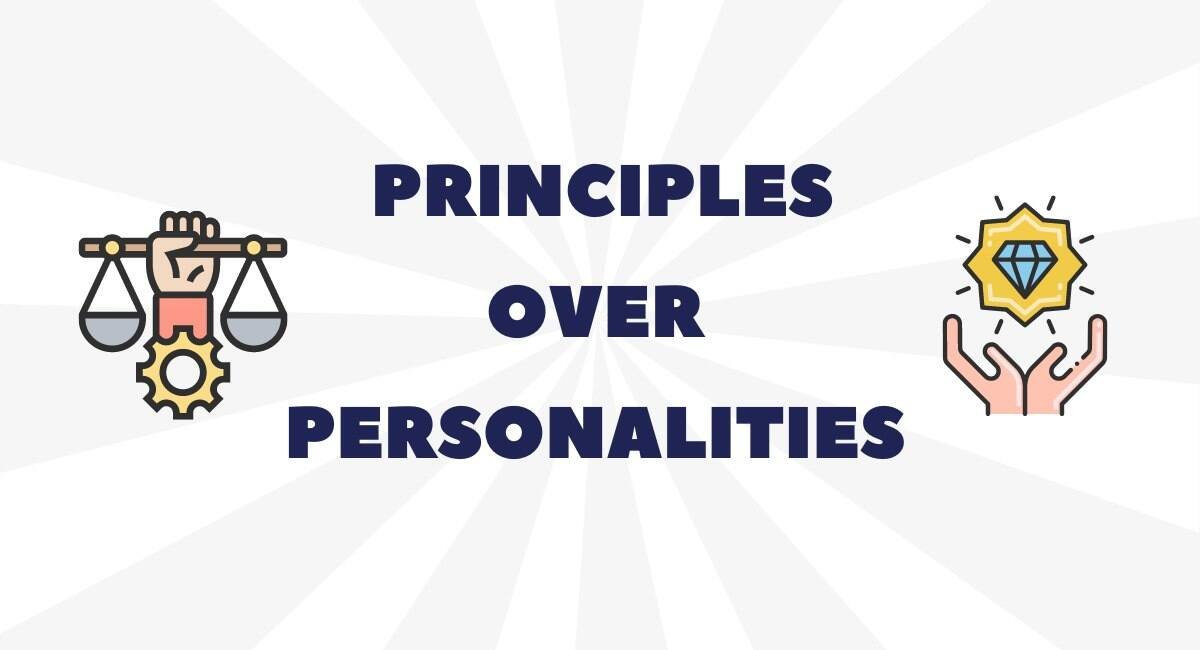In a world where personal opinions and identities dominate, focusing on principles over personalities is crucial.
Characteristics are often judged more than values in relations, politics, and life in general.
It’s easy to be influenced by popular beliefs or charismatic people when dealing with difficult scenarios or problems.
Principles help us be open-minded, respect diversity, and build deeper connections.
Identifying external influences and filtering out noise helps us make genuine decisions.
Principles over personalities mean we should decide based on beliefs, not just people’s influence.
While charisma and charm can captivate, they do not equate to sound judgment or moral integrity.
The guiding principles of our behavior should be our primary concern rather than the personalities of those we interact with.
We need to examine our values as society becomes more interconnected.
The article highlights the importance of placing principles over personalities for personal and collective growth.
Understanding the concept of Principles over Personalities

Principles are beliefs or guidelines that define our actions, behavior, and ethics.
They form the cornerstone of our moral compass and help guide our judgment when distinguishing right from wrong, good from bad, and vice versa.
Prioritizing principles over personalities is about valuing ethics over superficial traits.
It is a well-known phrase in Alcoholics Anonymous (AA).
Being true to oneself during tough times can be done by concentrating on one’s values rather than their appearance.
“Principles over personalities” doesn’t mean individuality isn’t important; it just means values matter more than traits.
It encourages a balanced approach where personal charm and ethical standards work well together.
Personality vs. Principle
The table highlights key points under personality and principle. Here’s a simple representation:
| Aspect | Personality | Principle |
| Foundation | Rooted in the personal opinions and identities | Rooted in beliefs and ethical guidelines |
| Judgment | Characteristics judged more than values | Values prioritized over superficial traits |
| Influence | Influenced by popular beliefs | Decisions based on beliefs, not just influence |
| Open-mindedness | Prone to external pressures shaping decisions | Principles help in being open-minded |
| Decision-making | May lack sound judgment or moral integrity | Guided by moral compass and ethical principles |
| Connection Building | Relies on charisma and charm for connections | Builds deeper connections through shared values |
| Self-awareness | Emphasis on appearance | Focuses on virtues and moral orientation |
| Personal Growth | Limited growth potential | Facilitates personal and collective growth |
| Success | Success may be based on popularity or image | Success may be based on purpose, convictions and relationships |
| Values Identification | May lack a strong sense of core principles | Encourages self-reflection and introspection |
| Ethical Decision-making | May struggle with ethical dilemmas | Principles provide guidelines for righteous decisions |
| Trust and Respect | Trust built on personalities | Trust and respect cultivated through shared values |
| Understanding Others | Superficial understanding of others | Deeper insight into values and beliefs of others |
| Forgiveness | May struggle with forgiveness | Principles encourage forgiveness in relationships |
| Communication | Communication influenced by appearances | Open and honest communication based on standards |
| Leadership | Charismatic leadership style | Value-driven leadership inspires and motivates |
| Conflict Resolution | May avoid conflicts or resolve them poorly | Effective conflict resolution through principles |
| Integrity Culture | May lack a strong ethical foundation | Principles contribute to an integrity culture |
| Overcoming Challenges | May succumb to outside constraints | Strategies to stick to principles despite challenges |
| Resisting Temptation | May compromise under compulsions | Proper approaches to resist temptations and peer pressure |
| Transformative Power | Limited impact on personal and unified progress | Transform life, promotes personal growth, and leaves a lasting legacy |
The Significance of Embracing Principles
The value of adhering to beliefs is immense.
A strong and successful life stands on the framework of principles.

They offer us purpose and direction.
The benefits of embracing principles include the following:
Making Ethical Decisions.
As we navigate an ever-grown world, knowing what steps to take or how to act is challenging.
Principles can provide us with guidelines for decision-making, even when facing dilemmas.
Living with Integrity
Lives guided by principles are more inclined to succeed in life. They make better choices, have purpose, and relate better to others.
Building Trust and Respect
We are happier to relate to those who share our values when we follow our ideals. This can nurture a feeling of intimacy, which is enriching.
Enhanced Success Chances
Principle-led people feel more meaningful and form deeper relationships with others. Personal development is promoted.
Embracing principles requires an effort that you will continue throughout your life.
Cultivating Resilience
Principles fosters resilience during tough times.
When people follow strong principles, they handle challenges better.
This resilience stems from the stability and consistency of principles, guiding them through uncertainty.
Ideas to begin with:
- Figure out what principles are essential to you. What do you stand for? What is most important to you? Once you’ve established your principles, stick to them.
- Commit to your values even when it’s difficult. If you only follow your principles sometimes, they won’t work well.
- Learn from your errors. The key is to learn and strengthen. When you mess up, figure out what went wrong and resist repeating it.
- Have patience. Establishing basic values and complying with them takes time.
- Keep trying; do not give up if you don’t see instant results. Maintain your efforts, and you will eventually achieve your objectives.
Identifying Core Principles

Core principles define an organization or individual. Everything is based on these beliefs.
To successfully identify our principles, we must have enough courage to face our fears and stand up for what we believe in.
In addition, humility is necessary as we come to terms with our limitations while welcoming contributions from others.
But it’s not always simple to find basic principles. It requires the following activities:
Self-Reflection and Introspection
To identify core principles, individuals need to engage in self-reflection and introspection.
Objectively identify personal values through self-reflection.
Self-defining analogies help in marking self-reflection, making personal values and beliefs clearer through relatable comparisons.
Once these values have been determined, individuals can use them as a framework for deciding or judging actions.
Awareness of the consequences and taking responsibility help people stay true to themselves.
The primary objective is to improve our self-awareness.
We explore our values, beliefs, and goals. We also examine our thoughts, feelings, and behaviors.
Embracing Empathy and Compassion
Empathy and compassion are key to building connections and promoting a compassionate society.
Empathy and compassion create connections with others, resulting in a society with greater kindness.
These principles touch on the essence of humanity beyond personalities.
We gain deeper insight into the values and beliefs of others by seeing life from their point of view.
This transcend superficial differences and build bridges between individuals.
Compassion is a key principle for promoting well-being and easing suffering.
It inspires us to show kindness and understanding, even in challenging situations.
Judging people based on character, not appearance, is accepting principles over personalities.
Balancing Courage and Humility

Courage means confronting fears and acting, standing up for beliefs even if they are unpopular.
Humility means acknowledging our flaws, learning from others, admitting our mistakes, and making changes.
While courage empowers individuals to take risks, step out of their comfort zones, and assert their beliefs confidently; humility keeps them grounded and open-minded.
It is about recognizing that one’s wisdom and knowledge are limited, creating space for learning from others’ experiences.
Courage and humility result in moral actions, standing up for right and being open to learning.
Balancing courage and humility also means acknowledging that we all have room for improvement.
Here are some tips for balancing courage and humility to identify core principles:
- Be open with yourself concerning your values. Your top priorities are? What do you believe in? Once you know your values, you can mark the principles that align with them.
- Be willing to challenge your assumptions. Just because something is the way it has always been done doesn’t mean it is the best way to do it. Be willing to question your assumptions and consider new ways of thinking.
- Be open to feedback from others. Consult those you trust and get their opinions. Consider their feedback and be open to changing your mind.
People also like:
Overwhelmed with too many things to do
When motivation fails discipline prevails
Values Clarification Exercise
A values clarification exercise helps people figure out, understand, and rank their core values.
Activities and questions help you understand your principles.
This clarity influences your decisions and actions, creating a more purposeful and fulfilling life.
Legacy Perspective
The “Legacy Perspective” focuses on your lasting impact on others and the world.
It urges you to consider what you want to leave behind and how future generations will remember your actions, values, and achievements.
You make choices that align with your core values and create a lasting positive impact.
You consider the bigger picture of your life’s impact, not just short-term gains or immediate concerns.
Implementing Principles in Personal and Professional Life
Principles upgrade both our personal and professional lives.
Examples of applying principles in personal and professional life:
• Developing trust: Abiding by our principles makes us more trustworthy. Trust is based on keeping promises, honesty, and reliability. Trust cultivates healthy connections with people in our lives.
• Fostering respect: Principles foster respect for others. We’re more likely to treat someone with dignity and consideration when we admire our values.
We are more likely to listen to their perspectives, appreciate their contributions, and act fairly and justly.
Respect is promoted in our relationships, which is necessary for a pleasant and healthy dynamic.
• Enhancing understanding: Principles assist us in understanding others. We are more prone to strive to understand others’ points of view and appreciate their differences.
Comprehension in relationships gets refined, which is necessary for a meaningful connection.
These are essential for effective collaboration and for appreciating the less apparent aspects of success.
• Promoting forgiveness: Principles encourage forgiving. We are more willing to forgive people when they violate our ideals when we live by them.
Being imperfect is an aspect of being human.
This encourages forgiveness in our relationships, which is necessary for healing and progress.
• Better communication: Principles promote open communication. We are honest with people about our ideas, feelings, and needs when we trust our beliefs.
We are more receptive to feedback and listen to others.
Open communication is important for regard, comprehension, and faith in our connections.
• Value-driven leadership: Principle-driven leaders inspire and motivate their staff, generating a positive work atmosphere.
• Fixing conflict resolution: We seek diverse viewpoints, compromise, and create inclusive solutions.
Avoiding conflict and building a firm foundation requires better conflict resolution in relationships.
Living our principles increases the likelihood of effectively resolving the disagreement.
• Creating an Integrity Culture: Integrity is being sincere while defending moral values.
Integrity makes us more mature, respected, and successful; incorporating values into organizational culture strengthens its ethical fabric and improves its reputation.
This, in turn, helps individuals develop a self-concept that is more aligned with their personal and organizational goals.
A “Personal Ethics Statement” is a self-written document that outlines the values behind your professional decisions and actions.
Regularly reviewing and updating it helps ensure your daily work reflects your core beliefs.
Overcoming Challenges in Upholding Principles

Maintaining our ideals may be difficult when the world opposes us.
Situations can oppose our commitment to integrity and ethics.
Difficulties can take on many forms, such as work and personal life.
We may face opposition or criticism from individuals who disagree with us. It is not simple to defend our ideals.
Ethical Pre-commitment is a great way to handle challenges and uphold your principles.
You decide to stick to your values before challenging situations come up.
For example, a business leader might promise not to engage in insider trading, so it’s easier to resist if tempted later.
Pursue these strategies if you face trouble sticking to your principles:
First, know your values and stick to them. Tell me about the principles you hold dearest.
Just what do you have faith in? Realizing your beliefs makes it easier to spot when they’re being tested.
Second, be ready to protect your beliefs. This does not necessitate an aggressive stance.
However, this requires you to speak up when you are undermined.
Discover friends who admire your ideals. Find people who support and encourage you to uphold your principles.
This might be anyone from close relatives and buddies to co-workers and members of your local or national community.
Fourth, don’t be hesitant to give something up.
You may have to forego some opportunities to be true to your values.
Forgoing opportunities, taking risks, or accepting unfavorable outcomes are all possibilities.
These costs may seem high, but attaching to your values is always worth it in the long run.
Fifth, keep in mind that you have support. People struggle to remain true to their values.
There are helpful resources, like books, articles, and forums available.
It’s also a way of showing others we are steadfast in our convictions.
Resisting Temptations and Peer Pressure
One of the key challenges in upholding principles is the temptation to compromise when faced with difficult situations.
While it can be hard, avoiding temptations and peer pressure is important if we want to get through personal problems and maintain our values.

Recall what triggers you. What factors increase your tendency to fall prey to temptation? If you attempt to lose weight, you may be more likely to eat unhealthy foods if you are stressed or exhausted.
Once you’ve identified your triggers, devise ways to deal with them.
What will you do when tempted? It would be helpful if you designed a strategy. A strategy can prevent temptation.
Imagine yourself doing well. Spent a little time each day seeing yourself successfully avoiding temptation and upholding your beliefs. This keeps your drive and concentration.
Dealing with Conflicting Values. In times of clashing views, accepting basic concepts helps.
We must study all outcomes to find the best one. This could involve considering each option’s pros and disadvantages or expenses and benefits.
After choosing the finest alternative, we must have the guts to uphold our values.
We must face our fears and act to preserve our principles.
Motivation plays an important role in upholding values, but it can fade easily. Discipline takes over from motivation to keep you moving.
We need self-discipline, a powerful community, and a clear vision to resist temptations.
The Transformative Power of Principles
Principles enable you to make adjustments that will advance your life.
Principles guide us to make better choices and live better lives, transforming the world.
We are more likely, to be honest, compassionate, and fair.
Standing by principles promotes personal growth. You are more likely to be successful in your personal and professional spheres.
The power of principles extends beyond individual growth to societal progress.
Historical figures like Mahatma Gandhi and Martin Luther King Jr. showed how unwavering commitment to non-violence and equality can drive significant social change.
In business, companies that follow sustainability and ethics often become leaders and set standards for the industry.
Principles lay the groundwork for a lasting legacy that influences future generations.
Shaping a legacy requires vision and persistence, as it extends far beyond one’s lifetime.
It starts with setting noble goals and instilling values that transcend generations.
The transformative power of principles is the base of a lasting legacy.
Guided by unwavering values, one can inspire profound change and impact.
This leaves a positive imprint on humanity’s journey.
Conclusion
“Principles over Personalities” is about putting our beliefs first, not temporary things.
The approach offers a stable foundation for decision-making and relationship-building in our complex and connected world.
A framework for making choices aligned with our core values and beliefs is crafted.
Ethical decision-making, living with integrity, building trust and respect, and increasing success chances are possible outcomes of adopting standards.
By consciously cultivating and adhering to our core principles, we enhance our personal and professional lives and contribute to a more moral and ethical society.
Conforming our actions with our principles is a continuous process that needs regular reflection and adjustment.
The rewards, like personal satisfaction, career success, and positive social effects, are well worth it.